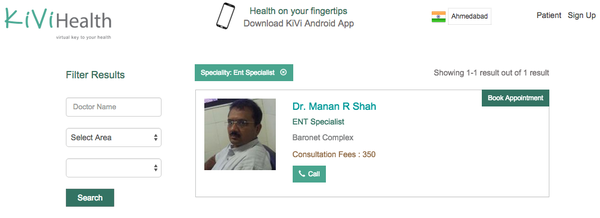Indian startup aims to make e-health records available to patients
29-Jul-15, by Pete Read, Global Growth Markets
A health tech start-up in India aims to provide affordable, patient-centric, centralised digital medical records that can be used across multiple hospitals and clinics.
Adverse drug reactions are noted in 10-15% of all hospitalised patients, resulting in worsening of the medical condition, and sometimes death. In 2014, reported deaths due to adverse drug reactions and allergies in India numbered 8,500, although the real number is probably much higher.
Almost all these cases could have been prevented if complete information about the patient’s medical history had been available to the doctor. And that is what start-up KiviHealth aims to achieve with its HIPAA compliant digital health record solution, including a digital prescription pad to make it easier for doctors to adopt the system - a proven sticking point for conversion to digital records.

Image: KiviHealth
KiviHealth co-founder Rajan says “Our product is based on the vision to provide patients with access to all their health information, bring more clarity to medical management and let patients manage their health better.” The service also enables patients to connect with doctors online, book appointments and tests, and order prescriptions via its website kivihealth.com.
With a mission to ensure that all health information is captured and digitised right at the source, KiviHealth provides medical records management systems to clinics and hospitals, is open to integration with existing medical record systems, and provides patients a central, safe access to their own health information.
Less than 3% of India’s healthcare providers are using any kind of digital tool in their hospitals, clinics or labs, according to KiviHealth. And those who are tend to keep the patient away from that information, making it redundant if the patient happens to visit another health facility. This leads to inadequacies in patient care such as loss of patients’ records, multiple visits to diagnostic centres, futile second visits to doctors, inadequate treatment plans due to lack of past medical records, and so on.
Developed nations which were early adopters of electronic health records now appreciate the need for a central health information exchange which facilitates easy, yet secure, exchange of a patient’s information between different hospitals and clinics. Co-founder Bhanu says “The fact that EHR in India is yet at a very nascent stage provides an opportunity to ensure that we learn from those mistakes and are on the right track from the very beginning.”
Aside from helping to prevent adverse drug reactions, Bhanu notes that “the benefits of a central health record system are much more than we can imagine right now. To name a few, medical management across physicians more streamlined… patient medical records are readily accessible in emergencies, home care services can be managed more efficiently, medicines and lab tests can be easily ordered by patients online. I am pretty sure that with evolving time, we will see many more not-thought-of benefits and multiple new business models being created.”
KiviHealth does not lack a grand vision. In addition to the private sector, the company is working with government and NGOs “to enhance the overall healthcare delivery system and improve patient outcomes, thereby, truly improving patient lives.”
